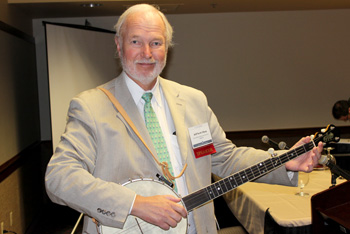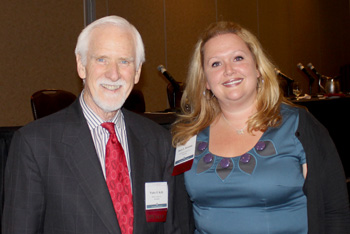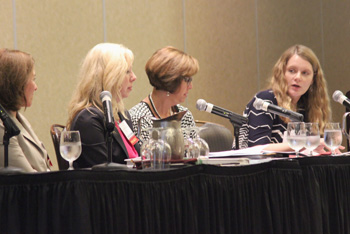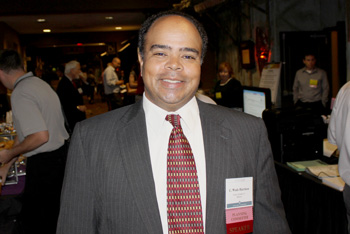
Jeff Scott Olson entertained and informed, strumming his banjo to lighten the mood during his presentation on Wisconsin’s common-law doctrine of wrongful discharge. Olson, “the product of a misspent youth in law school,” took up the banjo during that time as a distraction from the stressful demands of class. His playing received cheers from attendees.

Walter F. Kelly and Doris E. Brosnan kicked off the Institute with a morning plenary session, “Unique Issues in Healthcare Labor and Employment,” focusing on the relationship between medical staff, administration, and other employees. Kelly and Brosnan shared perspectives on the complexities of employment law in the healthcare workplace.
Aug. 23, 2013 – Where else do banjos and college sports converge with labor, employment, and health lawyers? Nowhere, that’s where – unless you attended the State Bar of Wisconsin’s Health, Labor, and Employment Institute in Wisconsin Dells.
More than 150 lawyers attended the two-day event (which ended today), learning substantive tips and tidbits from presenters on various topics in health, labor, and employment law.
We’ll give you some of those major tips right here, if you missed it, with highlights from presenters Ramogi Huma, the president of the National College Players Association, as well as banjo-playin’ Jeff Scott Olson, a Madison solo lawyer.
Tip 1: Banjos Lighten the Mood
Those attending Jeff Scott Olson’s presentation on common law wrongful discharge were pleasantly surprised when he whipped out his banjo to lighten the mood. We checked the handbook on this. Turns out, this is a case of first impression.
“These CLE lectures are fairly dry and uninteresting, except in an intellectual way,” Olson said. “It’s nice to give people a little entertainment.”
Olson is a plaintiff-side civil rights lawyer who brings actions on behalf of individuals and small companies. Strumming occasionally, Olson focused on how the employment at-will doctrine and wrongful discharge interact together in Wisconsin.
“The remedies for wrongful discharge are limited to reinstatement and back pay. Attorneys should try to find some more powerful claims,” he said, that might allow other remedies, including compensatory and punitive damages for egregious conduct.
Tip 2: Lawyers Can Help Protect NCAA Athletes
Ramogi Huma, a former UCLA linebacker and now president of the National College Players Association, is fighting to protect athletes from what he says are inadequate NCAA rules and policies. The judicial system, he says, plays a crucial role.
“While the NFL has responded to mounting evidence that links brain trauma to football,” he says, “the NCAA’s policy is not to get involved, unfortunately.”
He says the NCAA requires schools to develop concussion protocols for head injuries, but schools have an interest in keeping their top players on the field. In addition, he says the NCAA does not police whether schools are following their own protocols.
“It’s not against NCAA rules to put players who are suffering from brain trauma back on the field,” he says. “This puts athletes at serious risk of brain trauma.”
He says he NCAA should be involved on such a critical issue, and litigation in this area is pending. Former football players saying the NCAA was negligent on concussions.
This is just the tip of the iceberg, Huma says, and lawyers can help address the rights of college athletes who don’t have a voice against the big business of college sports.
“Lawyers who are interested can provide a great service to these players, because the judicial system is a powerful forum to protect their rights under the law,” Huma said.
Read more about the issues in a State Bar article (login required) and look for video clips featuring Huma on the State Bar’s You Tube page in the coming weeks.
420
315
http://www.youtube.com/watch?v=81WHo2hR3oM
Ramogi Huma, Founder and Executive Director of the National College Players Association, discusses NCAA rules that leave college athletes without basic protections for injuries – despite the billions of dollars they generate. Huma, a former UCLA linebacker, emphasizes that college athletes are not only unable to receive protections from workers compensation, colleges are not required to pay for their athletes' sports-related medical expenses during or after their collegiate careers.
Tip 3: Social Media and FMLA are Colliding
Qualifying for and properly granting medical leave under the Family and Medical Leave Act do not end the legal issues for employees and employers, as attorneys Sandra Graf Radtke and Patricia Lauten explained.
Increasingly, social media is the source of FMLA conflicts between employer and employee, says Lauten, deputy city attorney for Madison.
Consider this hypothetical: intermittent leave for migraine headaches.
“The employee could be out on FMLA for a migraine, but he or she is seen on TV singing at the capitol, or posts photos through social media that call into question whether use of FMLA was legitimate,” Lauten said.
Posting photos of your day sailing? That could be a legitimate use of FMLA, says Graf, an employee-side lawyer at Gillick, Wicht, Gillick and Graf S.C. in Milwaukee.

Christine C. Duval-Senty, Marybeth Herbst-Flagstad, Julie A. Lewis, and Amy L. Marquardt, a panel representing employers, providers, and insurers, share their real time experiences with the actions taken or to be taken as the Patient Protection and Affordable Care Act moves forward.

Planning committee member and plenary speaker, C. Wade Harrison, co-presented Friday's session, “Regulating Off-Duty Conduct: Social Media, Use of Lawful Products, and Employee Rights Away from the Workplace.”
Visit the State Bar of Wisconsin on Facebook for more photos of this event, or click here.
Aside from social media, and drawing on the migraine headache hypo, Radtke points out the other laws at play in FMLA situations.
“These headaches may be so debilitating that the employee may have a disability under the Wisconsin Fair Employment Act or the Americans with Disabilities Act, she said.
Tip 4: Planning is Key for Affordable Care Act
“For employer’s, this is a year of planning,” said Julie Lewis, who practices employee benefits law at Nowlan & Mouat LLP in Janesville. Lewis was on a four-member panel discussing the federal Patient Protection and Affordable Care Act.
“Right now, it’s important that employers learn what the law requires and what the options are,” said Lewis, noting that large employers (more than 50 full-time employees) have until 2015 to meet certain requirements of the law.
But remember, open enrollment in online marketplaces, known as health insurance exchanges, begins Oct. 1 for effective dates on Jan. 1, 2014, says Christine Duval -Senty, a general counsel and compliance officer for Dean Health Plan in Madison.
Tip 5: Stay Current on Technology
Changes in technology and the expansion of social media continue to spark litigation between employers and employees, says C. Wade Harrison, and employment and labor lawyer who also deals with health law issues at Godfrey & Kahn S.C.
“Employer’s may be put in a position of managing employee behavior that is happening outside the workplace,” said Harrison, an employer-side lawyer. “We see this in the FMLA and worker’s compensation realms. But it’s also happening in other contexts too.”
For instance, Harrison noted a pending Virginia case in which a sheriff, after his reelection, fired five deputies who had “liked” his political opponent on Facebook.
“One of the reasons I enjoy this area is because it is new, it is emerging,” Harrison said. “The technology is so new, and it’s always changing. This will continue to be a prevalent issue going forward, and employers, and their lawyers, will have to stay current.”
Upcoming Event: Solo and Small Firm Conference
Don’t miss the Wisconsin Solo and Small Firm Conference, Oct. 24-26, which will be held at the Kalahari Resort in Wisconsin Dells. To see the schedule or to register, visit the WSSFC webpage.
